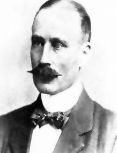View entry
Name: GIBBONS, Alfred St. Hill (Major)

Birth Date: 9 Nov 1858 Wavertree
Death Date: 15 July 1916 Bazentin, France, Battle of the Somme
First Date: 1900
Last Date: 1905
Profession: Sportsman
Married: In London 1898 Constance Emily Wood b. 1862 Whitwick, Leic., d. 9 June 1930 Bude
Children: Barbara Constance St Hill (16 Jan 1899 Bude); Diana Ethel St Hill (20 Oct 1905 Folkestone-1995)
Author: 'Africa From South to North Through Barotseland' 1904
Book Reference: North, Sportsmen, Chandler
War Service: East Kent Regt.
General Information:
North - Travelled from South to North through Africa passing east of Lake Edward Feb-April 1900; at Kampala 'recently at Lake Kivu' 31-3-1900; Employed to manage the Zionist Congress expedition to EA with Alfred Kaiser & N. Wilbusch, dep Trieste for Mombasa 28-12-1904; Firearms registered at Mombasa 14-1-1905; expedition arr. Nakuru on way to Uasin Gishu 17-1-1905; returned to coast at end of expedition, dep. Mombasa for Europe 12-3-1905
Sportsmen - To many thousands the history of the Dark Continent has held an irresisitible fascination since the days of Livingstone, and in more recent times the wonderful mysteries of new lands and strange peoples have added considerably to the interest that surrounds it. During the last decade of the 19th Century, Lt.-Colonel Alfred St. Hill Gibbons played an active part in exploring the remote regions of Central Africa. A son of the late Mr John Gibbons, he was educated privately and at Christ's College, Cambridge, where he indulged in all forms of vigorous sport, rowed in the 1st college boat, played in the first cricket and football elevens, and in the first Rugby XV. Col. Gibbons was gazetted to the 3rd East Yorkshire Regiment in 1882, and was associated with this regiment for many years. In 1890 he made his first acquaintance with Africa, serving till 1893 with the Bechuanaland Border Police and taking part in 1891 in the operations on the Transvaal border, which frustrated the entry into Mashonaland of the armed Boer 'Trek' organised to dispute the British occupation. Returning to England he initiated in 1904 the movement to arrest the ruthless slaughter of African big game. He received the active support of the best-known sportsmen and naturalists of the day. This led, through the enthusiastic agency of the late Sir Clement Hill, KCB, of the Foreign Office, to the adoption of the Game Laws in the British Protectorates and Colonies and, later, in all foreign African Colonies. …………… [more on his exploration in Central Africa] In 1901 he proceeded to the seat of war in S. Africa, in command of a squadron of Younghusband's Horse (medal and 2 clasps) ……………… In 1905 he was selected as Chief of the Commissioners appointed to examine the Guas Ngishu plateau in British E. Africa and report for the information of H.M. Government and the Zionist organisation on its possibilities as an area for close agricultural settlement. This trip is described in his third paper read before the Royal Geographical Society. ………. [more] In 1898 he married Constance Emily, daughter of the late Rev. Henry Wood, vicar of Biddenham, Bedfordshire, and has issue, 2 daughters. His clubs are the Junior Carlton and Sports.
Cambridge Univ. Alumni pens. at CHRIST'S, May 27, 1878. [2nd] s. of John. B. [Dec. 5, 1859], at Mossley Hill, Liverpool. Schools, Bramham, Tadcaster and Royal Institution, Liverpool. Matric. Michs. 1878. Kept ten terms. Lieut., 3rd Batt., East Yorks. Regt., 1882; Capt., 1885; Major, 1907. Served with the Bechuanaland Border Police, 1891. Equipped an expedition into the interior of Africa, 1895. Took up farming in N. Rhodesia. Served in the Great War, 1914-19 (Lieut.-Col., R. Fusiliers, 1st Sportsman's Batt., and King's Liverpool Regt.; mentioned twice in despatches, 1916); died of wounds received in action, July 15, 1916. Author, Exploration and Travel in Central Africa, 1898; Africa from South to North. (Peile, II. 661; Christ's Coll. Notes; Army Lists; Scott, MSS.; The Times, July 20, 1916.)
